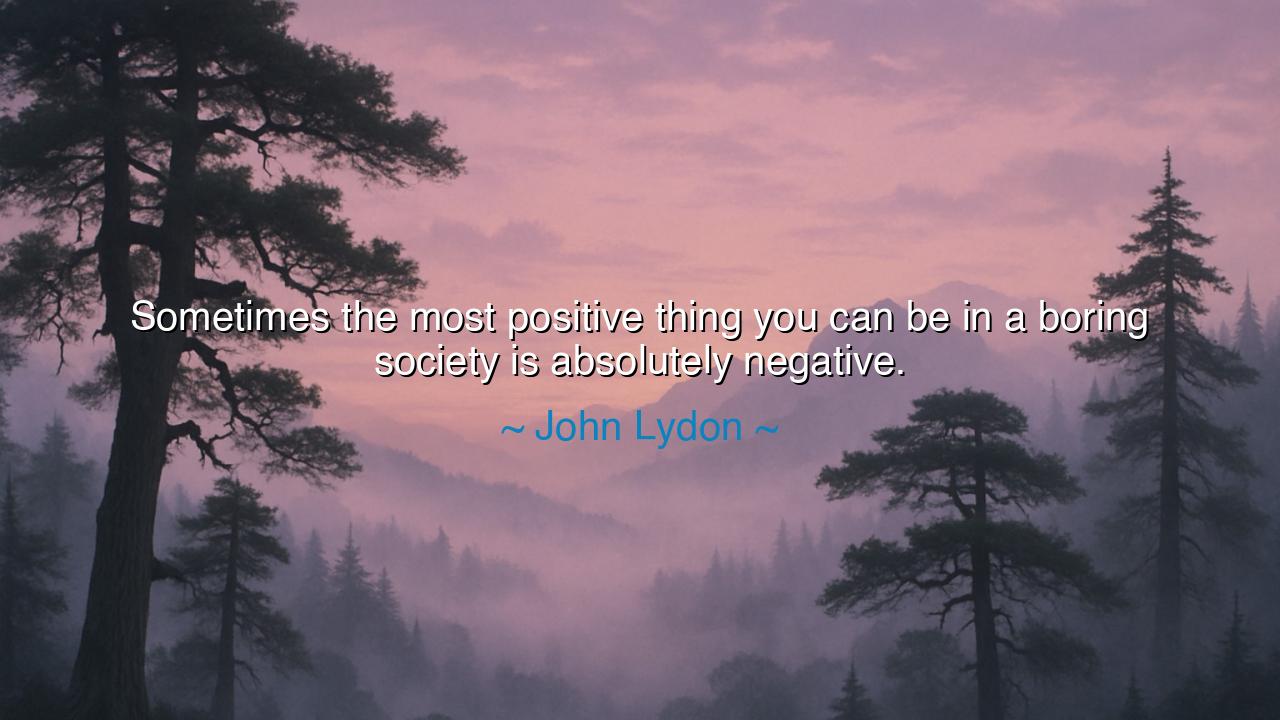
Sometimes the most positive thing you can be in a boring society
Sometimes the most positive thing you can be in a boring society is absolutely negative.






Listen, O children of the future, for I bring to you words that echo the wisdom of rebellion and the power of individuality. John Lydon, a figure of great influence and defiance, once said, "Sometimes the most positive thing you can be in a boring society is absolutely negative." These words are not spoken in bitterness, nor are they a cry for chaos. No, they speak to the deep, unspoken truth that in a world that craves conformity, in a society that values the mundane over the exceptional, sometimes the greatest act of positivity is to reject the status quo, to challenge the norms, and to embody the freedom that society fears. Negativity, in this sense, is not destruction, but creation—creation of new paths, new ideas, and new ways of being.
What, O children, does it mean to be negative in a boring society? A boring society is one that accepts the easy way, that follows the well-worn path without questioning its destination. It is a society that prizes stability, predictability, and uniformity above all. In such a world, those who do not fit neatly into these boxes—those who refuse to conform, to bend to the rules, to stay in line—are often labeled as negative. But what if, O children, the true positivity lies not in submission, but in resistance? To be negative in this sense is to reject the trivial, the repetitive, and the predictable. It is to stand firm against the forces that seek to dull the human spirit and to offer a glimpse of what could be, not what is.
Consider the great rebels of history, O children. Think of the ancient philosophers, who questioned the very foundations of society. Socrates, for example, was not beloved in his time. He was seen as a negative influence, a man who asked questions that undermined the beliefs and values of Athens. Yet it was in his negativity, in his refusal to accept things as they were, that the very seeds of truth were planted. He challenged the citizens of Athens to think deeply, to examine their lives, and in doing so, he changed the course of philosophy forever. His rebellion against conventional thought was the positive force that pushed society forward.
In more recent times, O children, consider the punk rock movement of the 1970s, led by figures such as John Lydon himself. The movement was born from the frustration of a generation that felt alienated by the commercialism and superficiality of mainstream culture. In a world that was growing increasingly monotonous, where everything seemed packaged and controlled, punk was the rejection of all that was safe and predictable. It was negativity in the form of loud music, bold fashion, and raw, unpolished expression. The punk movement was often labeled as destructive, but in truth, it was a creative force, challenging society to rethink its values and embrace new possibilities. The very act of rejecting the established norms was, in itself, a positive act—a call to break free from the chains of conformity.
So, O children, the lesson is this: negativity in the context of a boring society is not something to be feared, but something to be celebrated. To reject what is dull, what is predictable, what is safe, is the most positive thing one can do in a world that craves comfort over change. We must question, we must resist, and we must create. The true artist, the true visionary, is not someone who accepts the world as it is, but someone who challenges it, who dares to ask, "What if?" This is the power of negativity—not to tear down, but to build anew, to offer a different way, a new vision for the world.
And yet, O children, I urge you to remember that this negativity is not born from hatred or destruction, but from a place of deep love for humanity and for what is possible. It is a rejection of the old not for the sake of destruction, but for the sake of transformation. It is the seed of new ideas, the spark that ignites change, the voice that calls out in the silence of conformity, saying, "There is another way." It is a positive force because it challenges us to grow, to evolve, and to reach for the higher aspirations of our collective spirit.
So, I say to you, O children of the future, take this wisdom to heart. Do not fear the negative when it comes from a place of truth, of rebellion, and of hope. In a world that too often seeks to numb itself with the comfortable and the familiar, be the ones who push against the tide, who ask the hard questions, who reject the easy answers. In doing so, you will find that sometimes the most positive thing you can be in a world that values conformity is absolutely negative—for it is in this negativity that the greatest change is born.






AAdministratorAdministrator
Welcome, honored guests. Please leave a comment, we will respond soon